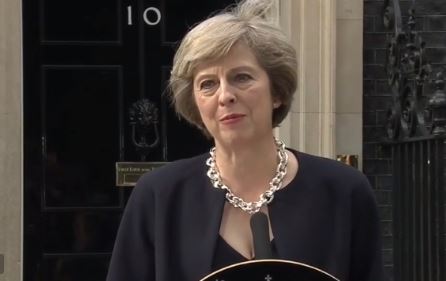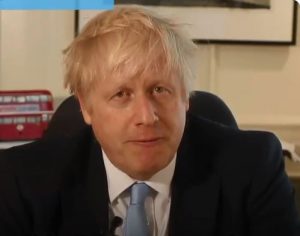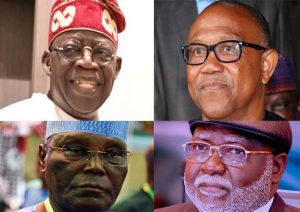
The Guardian / UK: Theresa May has informed the European council that she will trigger article 50 on Wednesday 29 March, but European sources have made clear that Britain could be forced to wait until June to embark on formal talks.
The prime minister’s decision to name the date on which the two-year Brexit clock will start ticking down came as her official spokesman also quashed speculation about an early general election.
Instead he made clear that the government’s focus was set to turn solidly towards the country’s EU exit, which is now guaranteed to be complete by the end of March 2019.
The president of the European council, Donald Tusk, responded quickly to say that he would distribute his response to the British government within 48 hours of next Wednesday. But sources made clear that it would take “four to six weeks” for the other 27 countries in the EU to reach consensus and start the more formal process.
May’s decision to spell out the starting date came after Jean-Claude Juncker claimed that “Britain’s example will make everyone else realise that it’s not worth leaving”.
And lead negotiator, Michel Barnier, hinted on Twitter that the EU27 were preparing to impose customs controls, despite May’s determination to secure “frictionless trade”.
The warnings underlined the rocky path that the prime minister will have to tread as she begins one of the most complicated negotiations of political history.
“I am very clear that I want to ensure we get the best possible deal for the United Kingdom that works for everyone across the United Kingdom and all parts of the UK when we enter these negotiation,” said the prime minister in Wales, at the start of a whirlwind UK tour aimed at drumming up last-minute support from the devolved administrations.
“I have set out my objectives. These include getting a good free trade deal. They include putting issues like continuing working together on issues like security at the core of what we are doing. We are going to be out there, negotiating hard, delivering on what the British people voted for.”
The prime minister – who also made clear that there would be no early general election – asked the UK ambassador to the EU, Sir Tim Barrow, to inform the European council president of the date.
However, EU sources claimed that May’s choice of next Wednesday meant she would miss the chance of a swift start to the negotiations, and instead have to wait up to six weeks for a formal response.
The prime minister’s chosen date shortens an already tight timeframe in which the British government hopes to both agree on the terms of withdrawal, including its financial liabilities, and successfully negotiate a “comprehensive free trade deal” with the EU.
The EU had hoped to offer a substantive political response to Britain at a summit pencilled in for the 6-7 April, but the notification date announced by Downing Street does not now make that possible, EU sources said.
Formal EU-UK negotiations are unlikely to start until mid-May at the very earliest, while some diplomats representing member states in Brussels believe it is more likely that talks will start in earnest in June.
Speaking to the Guardian, Gianni Pittella, the president of the socialist bloc in the European parliament, mocked the British prime minister’s slow progress in triggering talks, and warned that the EU would also be demanding agreement on Britain’s estimated £57bn divorce bill before trade talks could start.
He said: “Congratulations, Theresa May. Nine months to give birth to a date for article 50 notification. We will make sure that Brexit won’t affect EU and UK acquired citizens’ rights.
“Before negotiating the new relationship with UK, first and foremost we want substantial progresses on the withdrawal agreement to be ensured.”
Michel Barnier, who will lead negotiations for the EU, has also said the talks must proceed in that way, with experts lining up to warn that the two-year period will not be long enough for Britain to secure a future trading relationship.
However, a Tory peer who was involved in the drafting of article 50 told the Guardian that it was designed to allow the exit and trade talks to take place simultaneously.
Lord Kirkhope, who was a full member of the Convention on the Future of Europe that drew up the text that led to the Lisbon treaty, said: “As one of those involved in the drafting of article 50, I know that – whatever Michel Barnier says – it does allow for a parallel debate on both the terms of exiting the EU and the deal to be negotiated for after Brexit.”
Nevertheless, the two-year timetable is widely seen as extremely tight if May is to achieve her desire of securing a future deal before March 2019, especially given the need for around six months in which to ratify any deal.
Even with Tusk’s swift action, there will be around “four to six weeks” as EU states agree to the proposed response by consensus, according to a senior source.
Once the EU27 have formally adopted the guidelines, the European commission is expected to quickly present more detailed draft directives and recommend the opening of talks, which will then agreement by qualified majority at a meeting of ministers of the EU27, known as the general affairs council.
A date has yet been set for that ministerial meeting but it is only then that the talks with the UK will be formally opened.
Earlier rumours that the move would be made last week had to be quashed by sources close to the prime ministerafter Nicola Sturgeon declared her desire for a second Scottish independence referendum, leading to speculation that May had prevaricated because she did not wish to appear cavalier about the future of the union.
However, a Downing Street spokesman said the warning given on Monday morning was merely a matter of courtesy rather than a formal procedure designed to speed up the start of talks. “It’s simply a case of providing advance notice to help people on all sides,” he said. “We have always said we would trigger article 50 by the end of March and we thought it would be helpful to give advance notice.”
The prime minister’s spokesman said Barrow had a conversation with the office of the European council president, Donald Tusk, earlier on Monday to offer the EU notice of the date.
“There will be a letter, [May] will notify President Tusk in writing, and the prime minister has already confirmed she will give a statement to parliament as well,” he said. “More details will be given in due course.
“We want negotiations to start promptly, but it’s obviously right that the 27 have the opportunity to agree their position,” the spokesman said. “We fully expect they will want to do that in advance.
The Brexit secretary, David Davis, called the process “the most important negotiation for this country in a generation”.
“The government is clear in its aims: a deal that works for every nation and region of the UK and indeed for all of Europe – a new, positive partnership between the UK and our friends and allies in the European Union”, he said.




